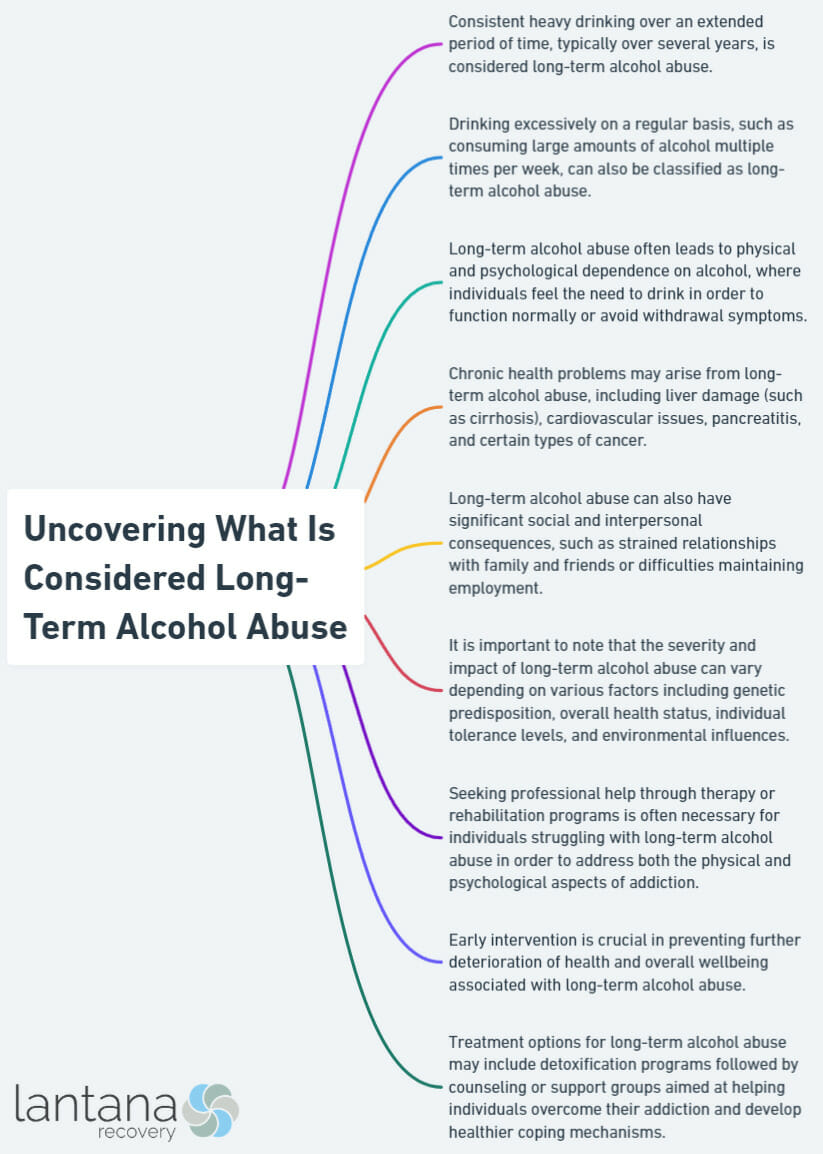The long-term effects of alcohol abuse can be devastating, impacting every aspect of a person’s life. But how can we differentiate between occasional or moderate drinking and what is considered long term alcohol abuse? This article will uncover the facets of long-term alcohol abuse, its dangers, and how to recognize its signs. Additionally, we will explore treatment options and preventative measures to help you or your loved ones navigate the challenges posed by alcohol addiction.
Key Takeaways
- Long-term alcohol abuse is characterized by cravings, lack of control and sustained use despite health or other issues.
- Recognizing the signs of long-term alcohol abuse can help guide individuals to seek appropriate treatment such as mental health professionals, addiction specialists and support groups.
- Preventing long term alcohol abuse involves adhering to daily intake guidelines and recognizing/addressing risk factors.
Defining Long-Term Alcohol Abuse

Long-term alcohol abuse is characterized by intense cravings for alcohol, lack of control while consuming alcohol, withdrawal symptoms when alcohol consumption is stopped, and ongoing excessive alcohol use despite health or other alcohol-related issues. Various factors, including genetic, psychological, social, and environmental factors, contribute to the development of long-term alcohol abuse, which involves drinking alcohol excessively. It is distinct from occasional or moderate drinking, as it involves intense desires for alcohol, incapability to regulate drinking, withdrawal symptoms if drinking is discontinued, and sustained drinking despite health or other alcohol-related issues.
If you or someone you know is struggling with the inability to control their urge to drink alcohol, it is advisable to contact a treatment provider. Seeking help early on can prevent the development of more severe alcohol-related problems and improve the chances of recovery.
Duration and Frequency of Alcohol Consumption
The National Institute on Alcohol Abuse and Alcoholism recommends that men should consume 14 drinks or fewer per week, and women should consume seven drinks or fewer per week to avoid the risks associated with too much alcohol. Consuming one alcoholic beverage per day, particularly in conjunction with a meal, has been associated with decreased risks for heart disease, diabetes, and other illnesses. Conversely, consuming seven or more drinks in a single day can lead to an inflammatory response that can adversely affect one’s health and potentially lead to becoming alcohol dependent.
During festive seasons, one should remain vigilant of their alcohol intake. Increased consumption during such periods could result in higher blood alcohol concentration levels and associated risks. A woman who consumes one alcoholic beverage daily is distinct from one who consumes three beverages on Friday and four on Saturday, regardless of whether they are of legal drinking age or not.
Severity of Alcohol Use Disorder (AUD)
Alcohol Use Disorder (AUD) is a chronic disorder characterized by a pattern of alcohol use that results in significant impairment or distress. According to the 2021 National Survey on Drug Use and Health (NSDUH), is estimated that 10% of heavy drinkers had alcohol use disorder in the past year. AUD is observed to be more prevalent in individuals in their 20s and 30s.
The severity of Alcohol Use Disorder (AUD) varies from mild to severe, based on the number of symptoms exhibited. Identifying the level of AUD in oneself or others is a key step towards addressing the problem and finding suitable treatment.
The Dangers of Prolonged Alcohol Abuse

Long-term alcohol abuse can lead to a plethora of health complications. Prolonged alcohol abuse can result in serious health complications, such as:
- liver disease
- heart disease
- cancer
- stroke
- depression
It may also alter the normal functioning of areas of the brain related to pleasure, judgment, and the capacity to restrain one’s behavior.
Moreover, extended alcohol consumption can result in serious medical, financial, and interpersonal difficulties. Alcohol and drug abuse are significant contributors to incarceration. According to National Center for Drug Abuse Statistics, approximately 80% of prison inmates struggle with substance abuse involving drugs or alcohol..
These alarming statistics serve as a reminder of the potential consequences of prolonged alcohol abuse.
Physical Health Risks

Prolonged alcohol consumption can have deleterious effects on the brain, heart, liver, and pancreas. Specifically, it may lead to stretching of the heart muscles, arrhythmias, stroke, and high blood pressure. Additionally, it can cause the pancreas to cease filtering toxins, resulting in pancreatitis.
Liver damage caused by excessive alcohol consumption, such as alcoholic fatty liver disease, can lead to:
- An accumulation of fat in the liver cells
- Hepatitis
- Fibrosis, an accumulation of proteins that results in the hardening of tissues or organs
- Liver cancer if alcohol abuse persists
For individuals with alcohol-related liver problems, continuous alcohol consumption poses significant risks. Some potential health issues include:
- Liver cirrhosis
- Hepatitis
- Fatty liver disease
- Liver cancer
Awareness of these potential health issues and seeking early assistance can stave off further complications.
Mental Health Effects

Long-term alcohol consumption can lead to a range of mental health effects, such as memory loss, impaired learning, impaired cognitive functioning, and an elevated risk of dementia. Prolonged alcohol abuse has been linked to the development of depressive disorders, anxiety disorders, and trauma- and stress-related conditions.
Alcohol misuse can intensify existing mental health conditions, resulting in increased anxiety and tension. Comprehending the effects of sustained alcohol misuse on mental health is crucial for those needing help and support in managing their alcohol consumption. If you are struggling with the mental health effects of prolonged alcohol abuse, we recommend immediately visiting a long-term alcohol addiction rehab.
Social and Relationship Consequences

Alcohol abuse can have detrimental effects on personal relationships, potentially lead to domestic violence, and create psychological trauma. In the workplace, alcohol abuse can lead to difficulties such as consuming alcohol before or during working hours, excessive drinking at night that leads to hangovers and impacts work performance the following day.
Recognizing the social and relationship consequences of alcohol abuse is crucial in seeking help and support.
Recognizing the Signs of Long-Term Alcohol Abuse

Identifying the signs and symptoms of long-term alcohol abuse is crucial for seeking help and support. Indications of long-term alcohol abuse can include:
- Augmented tolerance
- Withdrawal symptoms
- Disregarding duties
- Unsuccessful attempts to reduce intake
- Sustained use in spite of negative results
- Devoting a great deal of time to alcohol
- Waning enthusiasm in activities
- Relationship issues
- Physical signs
- Forming tolerance and dependence
If you’re worried about yourself or a loved one, it’s important to be aware of the behavioral and physical signs of enduring alcohol misuse. Prompt intervention can avert more severe alcohol-related issues and enhance the probability of recovery.
Behavioral Indicators
When identifying long-term alcohol abuse, it’s important to consider common behaviors associated with this condition. Behavioral indicators associated with long-term alcohol abuse may include:
- Drinking alone
- Concealing or misrepresenting drinking habits
- Prioritizing drinking over obligations
- Memory loss
- Impaired decision-making
- Sexual misconduct
- Aggression
- Shifts in mood
- Depression
- Anxiety
- Reduced motivation
Understanding these behavioral signs can assist individuals and their loved ones in identifying the signs of long-term alcohol misuse and seeking the right support and treatment.
Physical Symptoms
Long-term alcohol abuse can also present physical signs that may be indicative of a problem. Physical manifestations of extended alcohol misuse can incorporate:
- Modifications in appearance
- Weight reduction
- Inadequate cleanliness
- Modifications in sleep designs
Chronic heavy drinking can result in various physical symptoms, including:
- Liver damage
- Heart disease
- Brain and nervous system issues
- Anemia
- Cancer
- Seizures
- Gout
Recognizing these physical symptoms can aid individuals and their loved ones in identifying the signs of prolonged alcohol misuse and finding suitable support and treatment.
Treatment Options for Long-Term Alcohol Abuse

Various treatment options are available for individuals struggling with long-term alcohol abuse. These options may include:
- Outpatient or inpatient alcohol addiction rehabs
- Cognitive behavioral therapy
- Medications
- Alcoholics Anonymous
Seeking help early on can prevent the development of more severe alcohol-related problems and improve the chances of recovery.
For individuals and their loved ones, exploring the available treatment options and finding the approach that best fits their situation is important. With the right support and resources, recovery from prolonged alcohol misuse is achievable.
Professional Help
Mental health professionals, addiction specialists, and treatment centers play an important role in supporting individuals struggling with long-term alcohol abuse. Seeking professional help is one of the first steps to long term recovery from alcohol as these experts can offer guidance to help individuals identify the underlying causes of their alcohol abuse and develop effective strategies to address them.
Additionally, they can provide referrals to treatment programs and other resources to assist individuals in managing their alcohol abuse. Individuals may seek additional information regarding professional assistance for extended alcohol misuse from:
- their healthcare provider
- local Alcoholics Anonymous (AA) meetings
- online resources such as the Substance Abuse and Mental Health Services Administration (SAMHSA)
Support Groups
Support groups like Alcoholics Anonymous and other community-based resources can provide invaluable assistance to individuals seeking help with long-term alcohol abuse. These groups provide a supportive environment where individuals can share their experiences, learn from others who have faced similar challenges, and develop strategies for maintaining sobriety.
Beyond Alcoholics. Anonymous, there are other support groups like SMART Recovery, Women for Sobriety, and LifeRing Secular Recovery that provide alternative methods to tackle prolonged alcohol misuse. Individuals should explore various support groups and find one that aligns best with their needs and personal preferences.
Medication-Assisted Treatment
Medication-assisted treatment for long-term alcohol abuse involves the utilization of medications, such as buprenorphine, methadone, and naltrexone, in combination with counseling and behavior therapies to address alcohol use disorder and reduce withdrawal symptoms. These medications can help individuals manage their cravings and withdrawal symptoms, allowing them to focus on their recovery and maintain abstinence.
Medication-assisted treatment has proven effective in enhancing recovery and promoting long-term sobriety. According to Allison Robertson from Duke University School of Medicine, “MAT was associated with significant improvements in clinical outcomes in the 12 months following initiation versus the non-MAT comparison group, including larger reductions in mental health hospitalization and emergency department visits, and larger improvements in psychotropic medication adherence. ” (Medication-assisted treatment for alcohol-dependent adults with serious mental illness and criminal justice involvement: effects on treatment utilization and outcomes, Robertson et al., 2019)
It is important for individuals to consult their healthcare provider about this treatment option to ascertain if it is suitable for their circumstances.
Preventing Long-Term Alcohol Abuse

Prevention of prolonged alcohol misuse entails forming responsible drinking habits and identifying potential risk factors at an early stage. Prompt intervention can hinder alcohol-related issues in adolescents. Parents should be aware of potential signs and symptoms that may suggest an issue with alcohol in their teenagers.
Adhering to responsible drinking habits involves limiting the amount of alcohol consumed, avoiding binge drinking, and drinking only in moderation. By maintaining healthy drinking patterns and addressing risk factors, individuals can prevent the development of long-term alcohol abuse.
Establishing Healthy Drinking Patterns
To maintain moderate drinking habits and avoid excessive alcohol consumption, it is important to follow the recommended daily alcohol intake guidelines. Men should consume up to two drinks and women should consume up to one drink per day. The National Institute on Alcohol Abuse and Alcoholism defines one standard drink. It includes 14 grams of alcohol.
By following these guidelines, individuals can lessen their risk of alcohol-related health problems and steer clear of potential outcomes of prolonged alcohol misuse.
Recognizing and Addressing Risk Factors
Potential risk factors for long-term alcohol abuse may include:
- Genetics
- Psychological conditions
- Personality
- Personal choice
- Family history of alcohol addiction
- High levels of stress
- Peer pressure
- Drinking at an early age
Recognizing and addressing these risk factors can help prevent the development of long-term alcohol abuse.
Parents can lower the chances of teenage alcohol use by:
- Encouraging responsible behavior
- Setting clear expectations
- Keeping an eye on their children’s activities
- Discussing potential risks of alcohol consumption
Recognizing and tackling these risk factors can significantly contribute to preventing long-term alcohol misuse.

Summary
In conclusion, understanding the concept, dangers, and signs of long-term alcohol abuse is crucial in addressing this pervasive issue. By exploring treatment options, seeking professional help, and engaging in support groups, individuals can find the support and resources needed for recovery. Preventing long-term alcohol abuse involves establishing healthy drinking patterns, recognizing risk factors, and addressing them early on. With knowledge, support, and determination, individuals can overcome the challenges posed by long-term alcohol abuse and lead healthier, happier lives.
Frequently Asked Questions
What is considered a long term alcoholic?
Men and women who consume more than four or three drinks per day, respectively, or more than 14 and seven drinks per week, are considered to be long-term alcoholics.
Alcoholism is a serious problem that can have a devastating impact on an individual’s health, relationships, and career. It is important to recognize the signs of alcoholism and seek help if needed.
There are a variety of treatments available for those struggling with alcoholism.
What is a long term heavy drinker?
A long term heavy drinker is someone who drinks more than four drinks on any given day, or more than fourteen drinks per week for men, and more than three drinks on any given day, or seven drinks per week for women.
These guidelines are set by the National Institute on Alcohol Abuse and Alcoholism (NIAAA). Heavy drinking can lead to a variety of health problems, including liver damage, heart disease, and an increased risk of certain types of cancer. It can also lead to an increased risk of accidents and injuries.
Is 40 drinks a week too much?
At 40 drinks a week, the risk of developing liver disease is substantial and should not be taken lightly.
It is advised to limit drinking to 28 drinks per week or less.
What are some common physical health risks associated with long-term alcohol abuse?
Long-term alcohol abuse can have serious physical health consequences, such as liver disease, heart disease, cancer, stroke, and depression.
These conditions can lead to a decreased quality of life, and in some cases, death. Treatment for alcohol abuse is available and can help individuals reduce their alcohol consumption and improve their overall health.
How can I recognize the signs of long-term alcohol abuse in myself or others?
Observe changes in behavior, such as increased tolerance, withdrawal symptoms and loss of control when drinking, as well as physical signs like weight changes, skin issues and sleep difficulties.
These are indicators of long-term alcohol abuse.









